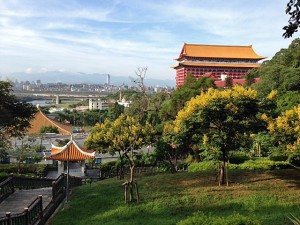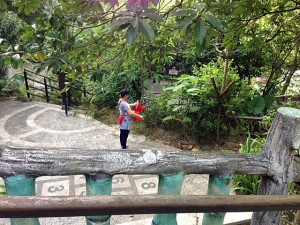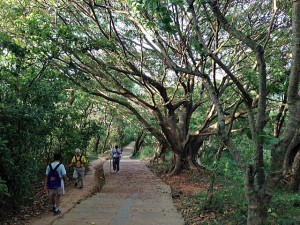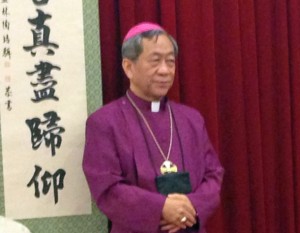September 19, 2014
The days start early, around here. I am up at 5:00 or 5:30; I pray, answer e-mail and update my blog. Then I put on running shoes and head out the door. Literally at my threshold is a connector to the Yuanshan Scenic Area, an urban park that is latticed with paved trails and stairways, winding up through the hills, past a Buddhist temple and (eventually) an observation platform that overlooks Taipei. You could wander through this for a couple of days and not repeat your steps. I go past groups of locals — walking, doing Tai Chi, practicing traditional dance, playing badminton, even singing some hearty karaoke. To the overlook and back, it’s about forty minutes.
Today, after breakfast, there is Eucharist — the Gospel text being the story of Jesus in the boat calming the waters of the storm for his terrified disciples. One of our chaplains, the Reverend Simon Batista, told his own story of surviving a terrible hurricane with his family at home in Haiti, holding onto each other even as the metal sheets of their roof disappeared one by one. His question at the end is one that I will walk with for a long time, a good one for us all: “Bishops: what do you do in the storms [that shake your lives and the lives of your people]? Are you making of each one a story to be written in the Book of Faith?”
This could be the theme for the day, as we listen, through the rest of the morning and into the afternoon, to presentations on Theological Contexts and Mission Challenges in three very different arenas: Taiwan, Hong Kong, and Pakistan.
The first came from our host, Bishop David Lai of Taiwan. Christian mission here faces enormous obstacles at the outset due to the mere facts of history. The Episcopal Church here was founded in 1954 in response to requests from American GI’s for pastoral ministry while they were stationed in Taiwan following WWII and the Communist revolution on the mainland. Though the Church was seen initially as an American enterprise, the missionary bishop, Bishop Kennedy of Hawaii, immediately began recruiting indigenous clergy. By 1965, there was a Chinese bishop for the diocese, James Wong, who is still remembered and greatly venerated. He is buried in the Church of the Advent near Saint John’s University (remember this!).
If the Episcopal Church here was seen as an instrument of the West, it also inherited the baggage of centuries of missionary blunders. From previous study, I knew that Christianity had a promising start in China when the Jesuit missionary, Mateo Ricci, came to China as a guest of the imperial court in the 16th century. He lived there for years, studied the Confucian classics, mastered the language, made friends with many of the Mandarin class, and enjoyed the favor of the emperor. Slowly the Church grew out of his friendships and relationships; he proclaimed the Gospel in a way that made sense, gave hope, and had intellectual integrity and weight. By the time he died in 1610, he left the foundations of a vigorous Christian mission in China. But this was completely dismantled over the next century by a controversy between the Dominicans and the Jesuits centering around the “ancestor rites.” Ricci had seen that this could continue in a Christian context, because he understood that these could be modified to acts of remembrance and veneration, not worship. The Dominicans and Franciscans wanted them banned, which they finally were, after a struggle of well over 50 years, by a papal bull in 1704. This condemnation backfired catastrophically, as the emperor turned against the Church and virtually snuffed out Christian witness in China. It was only brought back by colonial armies in the 19th century; and the repeal of the ban by Pius XII in 1939 did exactly nothing to improve relations with the Church.
Even though the clergy and Church now are thoroughly indigenous, Bishop David still faces the burden of this heritage. Parents ask young Taiwanese that if they become Christians, who will bring the parents the mandatory monthly offerings of food once they are departed? You can just hear it, can’t you: “We worked hard all our lives for you, and then when we’re gone you won’t even feed us?” That, at least, is a theological challenge; others are just the result of thoughtlessness. For example, the first logo of the diocese incorporated in its background the symbol of the Republic of China; unfortunately, that is also the logo of the dominant political party, so the Episcopal Church was instantly seen as “political.” Then, the government required all public institutions to conduct their affairs in Mandarin; so all prayer books and Bibles from the Episcopal Church are printed in Mandarin even though 70% of the people here speak a native dialect called Hokkien that is completely different.
What struck me through +David’s presentation was the way everything about the native context was marked by the fear of death. I thought of Hebrews 2:14-15: “Since therefore the children share in flesh and blood, he himself partook of the same things, that through death he might destroy the one who had the power of death, that is the devil, and deliver those who through fear of death were subject to lifelong bondage.” For instance, there is a folk belief that during the month of July, the ghosts of the dead come out of the place of the departed and move about freely. Almost no real estate changes hands as a result and other transactions are curtailed, because the spirits are abroad. Unlucky numbers abound. No one wants an apartment on the fourth floor of a building, a number associated with death. There can be a playful element in this, sometimes: at Saint John’s, students often go to the Church of the Advent when they are trying to find a quiet place to study; they tell each other, “Don’t fall asleep, or Bishop Wong will come up behind you and tap you on the shoulder!”
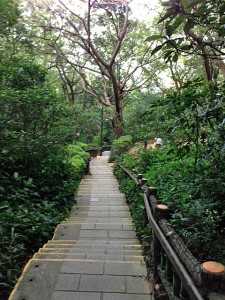 It isn’t surprising, therefore, that sometimes the Church’s best opportunity for mission lies in her response to death. The culturally normative fear of death is eased as non-Christians are invited into Church cell-groups, become acquainted with the faith through counseling or other community services, and see the love that greets their children in the Church’s multiple kindergartens. Christian funerals also become a powerful witness to non-Christian friends and family. Similarly, just as ancestor worship is linked to a concrete understanding of death as a physical realm that can be penetrated by food offerings, so the power of God must be represented as extending over all aspects of physical nature. David tells the teachers in his kindergartens, “Do not be silent with the parents of your children, when they put forward these old ideas, or when they say to you, ‘all religions are the same, just about helping us become good people.’ You do not have to criticize their beliefs. Just tell them what you know, that God is more powerful than a nuclear reactor, that he hears prayer faster than the speed of light, that he knows your heart and your soul and can communicate with you faster and better than any social media.” This approach to evangelism goes along with a deep commitment to Biblical formation, particularly of the young, and especially of lay leadership, through regular group study; teachers in kindergartens are all put through an intensive immersion in Scripture, so they can be sure of their witness through the Word that is on their hearts.
It isn’t surprising, therefore, that sometimes the Church’s best opportunity for mission lies in her response to death. The culturally normative fear of death is eased as non-Christians are invited into Church cell-groups, become acquainted with the faith through counseling or other community services, and see the love that greets their children in the Church’s multiple kindergartens. Christian funerals also become a powerful witness to non-Christian friends and family. Similarly, just as ancestor worship is linked to a concrete understanding of death as a physical realm that can be penetrated by food offerings, so the power of God must be represented as extending over all aspects of physical nature. David tells the teachers in his kindergartens, “Do not be silent with the parents of your children, when they put forward these old ideas, or when they say to you, ‘all religions are the same, just about helping us become good people.’ You do not have to criticize their beliefs. Just tell them what you know, that God is more powerful than a nuclear reactor, that he hears prayer faster than the speed of light, that he knows your heart and your soul and can communicate with you faster and better than any social media.” This approach to evangelism goes along with a deep commitment to Biblical formation, particularly of the young, and especially of lay leadership, through regular group study; teachers in kindergartens are all put through an intensive immersion in Scripture, so they can be sure of their witness through the Word that is on their hearts.
End of Part I
Next: Hong Kong, Pakistan, and Lessons for Pittsburgh!

